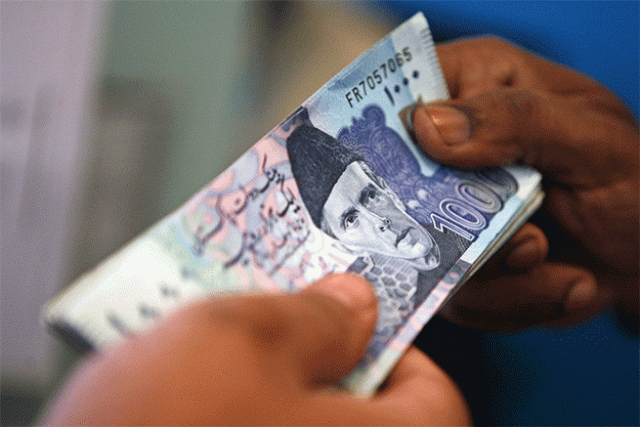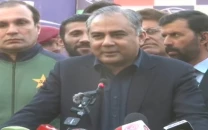Budget 2016 preview: For every rupee paid in taxes, 26 paisas will go to defence
Govt expected to allocate Rs817 billion towards the military, a 10% increase over last year

PHOTO: BLOOMBERG
For every ten rupee Pakistanis will pay in taxes next year, Rs2.60 is expected to go towards defence spending.
The government is expected to allocate Rs817 billion towards defence spending in fiscal year 2016, of which Rs772 billion is the regular defence budget and Rs45 billion is expected to be spent on Operation Zarb-e-Azb and raising a new special security division to protect the China-Pakistan Economic Corridor.
The proposed regular defence budget for paying salaries and operating expenses of the three service branches is just over 10% higher than fiscal year 2014-2015’s original budget of Rs700 billion, according to sources in the finance ministry. The other defence related requirements of the armed forces, primarily related to fighting the war against the Taliban and acquiring military hardware, are met through contingency grants, they added.
The Rs772 billion budget is almost a quarter of the fiscal 2016 tax target of Rs3.1 trillion assigned to Federal Board of Revenue. The government will levy over Rs200 billion in additional taxes in the new budget.
The new fiscal year will begin from July 1. The government has set an economic growth rate target at 5.5% and inflation target at 6% for fiscal 2016, according to budgetary framework that the Finance Ministry shared with the Senate Standing Committee on Finance and Revenue on Thursday.
In the new budget, only the defence and development allocations will be increased significantly while other expenditures are expected to be increased at lower than the inflation rate, effectively a cut in real terms, Finance Secretary Waqar Masood told the committee.
The government has allocated Rs45 billion for Operation Zerb-e-Azb and raising nine new battalions of the Pakistan Army for protecting the CPEC routes, said Masood. Another Rs25 billion to Rs30 billion is expected to be spent on internally displaced persons from the war and another Rs3 billion for reconstructing the schools and hospitals destroyed by the war.
The finance secretary said that next year’s overall budget deficit target is 4.3% of Gross Domestic Product (GDP) or Rs1,341 billion, including one-off expenditures on people affected by the military offensive. He said the 4.3% budget deficit will be achieved on the back of roughly 1% of GDP in surpluses run by the four provincial governments.
The secretary said that the federal government was incentivising the provinces to spend less and for the outgoing fiscal year would give roughly Rs15 billion in rewards for saving around Rs275 billion from their budgets.
Masood said the efforts would be made to enhance the economic growth to 5.5% in fiscal 2016, which clocked in at 4.24% this year against a target of 5.1%, mainly due to floods, reduction in commodity prices and the political logjam that shut down Islamabad for over a month.
The finance secretary said that the tax-to-GDP ratio will be increased to 13% in fiscal 2016, up from 11.5% expected by end of the current fiscal year.
FBR Chairman Tariq Bajwa told the committee that the tax target for the outgoing fiscal year has been slashed down by Rs206 billion to Rs2,604 billion. He said to achieve new fiscal year’s tax target of Rs3.1 trillion, the FBR will need to increase collection by Rs500 billion, or 19% of this year’s downward revised target. He said the government will withdraw the Statutory Regulatory Orders amounting to over Rs103 billion.
The government has targeted to bring down the national debt to 61.5% of GDP, which will be higher than the statutory limit of 60% of GDP. The finance secretary said that due to reduction in the discount rate this year, the government saved roughly Rs50-60 billion on debt servicing. He said the lower interest rates will also help curtail debt servicing expenses in the next fiscal year as well.
Published in The Express Tribune, May 22nd, 2015.



















COMMENTS
Comments are moderated and generally will be posted if they are on-topic and not abusive.
For more information, please see our Comments FAQ